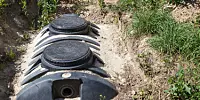How to finance a septic tank in France
The limited options include several types of loans and some discounts
Public grants to finance work on septic tanks are somewhat limited, despite the need for functional and hygienic systems being in the interest of the general public.
Gozzoli / Shutterstock
Purchasing, fitting, repairing and upgrading a septic tank (fosse septique) can prove to be extremely expensive. We look at what help is available to finance this work and how to get it.
Around 20% of French homes have septic tanks, however the percentage is far higher in areas without access to collective sewage systems.
Unfortunately, public grants to finance work are somewhat limited, despite the need for functional and hygienic septic tanks being in the interest of the general public.
Read more: Do I need conformity certificate for septic tank to sell French home?
How to finance a septic tank
An interest-free loan
You can get a 0% loan up to a maximum of €10,000 to be repaid over 10 years. All the major banks can offer this service, providing the loans under the éco-prêt à taux zéro scheme.
The loan either takes the form of a hypothèque (mortgage) housing loan, or a consumer credit loan, depending on your circumstances.
Note that in France only around 30% of housing loans are done through hypothèques, roughly similar to mortgage lending in the UK. The rest are done through regular bank loans, backed by a national caisse. Hypothèques are used for loans with higher risk to the bank.
A consumer credit loan
To obtain a consumer credit loan, you will have to convince your bank that you can pay it back – ideally, by producing payslips showing you have a full-time job with a CDI (contrat de travail à durée indéterminée) contract. If you work for yourself, expect them to require to see your books for the past five years or so.
A housing loan
To get a housing loan in the form of a hypothèque, your home will have to be valued by an expert, and you and your bank will have to sign the hypothèque documents in front of a notaire.
All this is likely to cost around €200 upfront, and you will also have to take out loan insurance, which for under-60s will probably cost at least €10 a month for a €10,000 loan. Loan insurance will cost more and be harder to get if you are over 60.
Recent changes in the law make it easier to switch loan insurance, but it is probably best to take the bank’s offer and then see if you can better it elsewhere at a later stage.
Contact France Rénov’
Subsidies are available nationally from ANAH, the government agency charged with improving energy-efficiency of houses. Its website does not give any information on what help is available for assainissement non-collectif, which is how a fosse is officially described. A France Rénov’ adviser may have more details of how much is available and how to apply.
Contact l’Agence de l’Eau
Some grants come from the public water agency or l’Agence de l’Eau, with local agencies, made up of government and local authority nominees, having different policies. Ask your mairie or communauté de communes for contact information.
Discounts for hardship and retirement
If you are in the French retirement system you might get grants there too. Local communes also give grants on a case-by-case basis, usually determined by hardship. Again, ask the mairie.
Finally, make sure the tradesperson installing the fosse gives you the reduced VAT tax rate, currently 10%.





























